One man’s journey from the hell of addiction to a life renewed
Jesse Lacouture, as a former addict, offers hope to those trying to recover from substance abuse.
When somebody wakes up in the morning, they eventually climb out of bed, brush their teeth, and go to work or school. Most people do not use any prescription medications unless they are injured. A majority of people do not grasp consuming a daily dose of cocaine. Few plan to spend their paycheck on drinks at the bar after work.
Jesse Lacouture, 33, was once a high school student in Millbury. He was in National Honor Society like some AMSA students. He was captain of the baseball team at his high school. He also played on the football team. There are countless teenagers across the United States who consider themselves “regular human beings.”
What were the chances Jesse would become an alcoholic and a cocaine addict? The same could be asked about today’s young adults who believe addiction won’t touch them. Jesse believed that he was destined to perform in front of thousands of people playing college baseball.
When Jesse found himself deep into his problems — alcohol, prescription meds, and most of all, cocaine — he felt trapped in this dangerous world. His life in addiction was a few moments in the party life followed by years of agony.
Through these episodes of suffering, Jesse lost his job, his marriage, and his freedom to do what he wanted. Today, though, is the eight-year anniversary of his sobriety. Over the years, Jesse has worked his way through recovery, starting with a detox at Spectrum Health and moving into rehabilitation afterward.
Now Jesse is engaged again. He lives with his family, including his son and two dogs. He has the job that he once lost to his habits and he took on the role of being the support for others who are now going through addiction.
It’s finally the dawn of a new day — but it came after a long, harrowing night filled with doubt.
“I found myself removed out of my son’s life due to my addiction,” said Jesse, referring to his son, Joey, now 10. “I got depressed. I got in trouble with the law. And instead of doing what a normal person would do, which would be to stop using, I dove harder.”
Teenagers and adults both experiment with momentary escapes from stress and reality through alcohol and drugs. It is human to try new things and gain new perspectives. They may grab one beer at home or ask the blunt to be passed to them at a party.
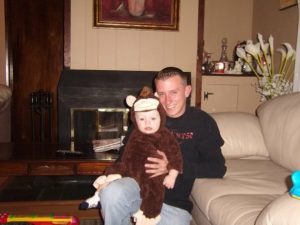
The prospect of losing his son, Joey, inspired Jesse to conquer his demons.
Countless songs paint marijuana or opiates as a safe, blissful escape from the stress of everyday life. Many music artists lean back at a concert with their microphone the same way they chug a bottle, a tool people use to relax or cope with the sudden changes thrown at them.
“Why can’t I have one bottle of beer with my friends?” some ask themselves. “Why can’t I indulge once in a while?”
But some families have demons that cling to them and are passed down through generations and, unlike ticks, aren’t easy to squash once you try to remove them. In Jesse’s case, it was alcoholism. A drink was a saintly feeling to everybody in the household who consumed them. But it became something that was distracting, crippling, and eventually killing.
Jesse’s father and uncle were both carpenters on a construction site in western Massachusetts. It was a blue collar job that gave them enough money for food and a little extra. Every day after leaving work, the brothers went to a local bar to drink through their money.
What was the point of spending the day working for pay if you weren’t going to have fun with what you earn? Rain, shine, or snow — as long as the bar was open, there was a drink to buy and a smile to exchange with your brother. The two would hang out and come home drunk together to prepare for the next work day.
One night when Jesse was 4 years old, his father never returned. When his mother went to check on Jesse’s uncle, he had no recollection of the events of that evening. He claimed he didn’t know where Jesse’s father was.
Jesse’s mother filed a missing persons report immediately, hoping that somebody would find her husband safe within the next few days.
What if he didn’t come home? She had three children to care for: Jesse; a sister younger by two years; and his brother older by eight years. A couple of days later, Jesse’s uncle killed himself. Something inside Jesse’s uncle couldn’t bear to continue life without his brother.
Jesse’s father still didn’t come home, and the police still searched for him. After 29 years, Jesse’s father is still, officially, a missing person. Jesse and his mother have speculated that he was killed by his brother after leaving the bar that evening and was buried somewhere under a huge plot of land in Hardwick, a small town between Amherst and Worcester.

Taking his son, Joey, to Universal Studios was Jesse’s ultimate reward for beating back his addiction.
Jesse’s mother was left alone to raise her three children. As a waitress, she earned only enough. There wasn’t enough cash to go around and create a comfortable home life. But it was enough to keep the children fed, which was the only thing that mattered in that situation.
Jesse’s older brother, who was 13 at the time, was likely the only one of the siblings to have remembered his father. Even before Jesse acquired his addictions, he and his family were shaken by the effects of his father’s demons.
Jesse’s brother became Jesse’s father figure, a character of good example to teach him the correct paths in life while dad wasn’t there. At the age of 13, Jesse was soon to enter high school, where he would become an achieving student and athlete.
Alcohol assaulted the family twice. In 1998, Jesse’s brother was driving drunk when he crashed. He was killed in the accident. It is easy for one to fall victim to a coping mechanism so easily accessible and have it tear a life apart, and that likely was what happened to Jesse’s brother, even years after his father’s death.
And the same need to cope consumed Jesse. He was missing the person he held most dear as his protector and the person who was supposed to show him guidance.
What happens to you mentally when your idol falls at the hands of demons?
For many people, the sudden destruction of the person you look up to as a mentor leads to catastrophic failure of action. It is hard to push past the loss of your hero. By the time he was a high school freshman, Jesse was drinking several times every week with his older brother’s friends so that they all could withstand the pain of losing him.
Alcohol did not affect Jesse’s performance in school. It was mild. He played sports throughout high school and was generally a well-performing student. He eventually expanded his experimentation to marijuana and hallucinogenic drugs. While they didn’t really alter him as a student, neither did he enjoy them too much. It wasn’t the escape he was seeking.
It then came time for Jesse to look for colleges to attend. He said that his mother did not have money to start looking for colleges. After receiving opportunities to go to colleges to play on baseball teams, he rejected them to live the life of the party.
He tried cocaine for the first time at age 17. It was heaven; it was love the moment he had it in his system. No other drug he ever experimented with was as uplifting or felt like freedom to him.
He learned to be a carpenter, just like his father and uncle. He carried this newly formed addiction with him like a virus. When Jesse found work in construction, cocaine had already taken over his body.
The drug was the climax leading to the falling action in Jesse’s personal tragedy. Aside from cocaine, he drank every day after work and experimented with opiates. It was never heroin. When Jesse broke his hand, he was prescribed Vicodin. He consumed all of his prescription, not because of his broken hand but because of the effects and he was soon consumed by opiates.
He tried Vicodin, Percocet, Dilaudid, and OxyContin. When describing, in an interview, the spiral from drinking to newly discovered opiates and stimulants, Jesse crossed his arms and stared down at the table in front of him, scrunching his eyebrows in anger. “I never knew how to stop. But I knew I needed to stop. But everytime I told myself I needed to stop, I got depressed. And I would use more and more and more and more.”
While he was working on the construction job, Jesse met a 19-year-old woman and got engaged. He was 22 and five years into cocaine, the cold, destructive force disguised as a helping hand.
A year later, Joey was born. Jesse wanted to be a good father because he wanted this boy to be raised right. He didn’t want his own son to grow up fatherless as he did.
Jesse got a job working for Jordan’s Furniture in Natick. He would go missing for days or even weeks at a time when nobody heard from him. He would be in a crack house in Worcester, where strangers around him would want to kill him and take everything he had on him.
Management at Jordan’s Furniture let him go, with the hope that someday he would become better and fit to work for them again. Jesse stole items from his sister, mother, and grandmother to sell for cocaine. He even took money from his mother’s mortgage.
But he was never a good drug dealer because he would ultimately use everything that he bought. Shortly after Joey was born, Jesse and his fiancée split up. Around the same time, Jesse was arrested for driving under the influence of alcohol. He was placed on probation and given two choices: either stay away from drugs and alcohol and get off free or get locked up and have the key melted to create a spoon for someone else’s heroin.
But there was a last condition Jesse had to fulfill. The court ruled that Jesse shouldn’t see his son any longer.
Joey became his one motive to try to become better, but it was difficult in the extreme because he just wanted to drink and get high more often. Addiction is water in the deep end of a swimming pool, except you swim with cinder blocks attached to your feet. He slipped straight into the pool from the little puddle on the edge.
Drinking was routine, and he couldn’t stop. When he tried, he became sick with shaking and vomiting in the morning. A cocaine high was followed by multiple days of sleep deprivation and the feeling of a vicious hangover. He described the withdrawal from prescription pills as “getting the flu.”
Becoming clean one day seemed a mythical impossibility. Almost every time he reported to his probation officer for drug and alcohol testing, he failed. At this point, he was 25 and weighed 110 pounds. His only wish was to be connected to Joey once again and learn to be a good father, but he was in conflict with his demons.
There came a point when he contemplated suicide. Maybe he would never be a good influence even if he squashed the addiction, he thought. Joey was 2 years old and could only see his father once per week. The possibility loomed that Jesse was going to be locked away and would never see his son again.
Jesse returned to court because he couldn’t stay away from drinking as he was ordered to do. The morning before, May 23, 2010, he called Spectrum Health System. He explained to the woman on the phone, in an act of desperation, that if he didn’t do something to kick his addiction, his son was going to be taken away permanently.
The woman from Spectrum said that Jesse could use a bed that they had in detox. The detox facility was down the street from the courthouse, so he requested that a message be hand-delivered stating the changes he was committed to making.
The judge allowed him to stay in detox instead of being locked up. Jesse found himself living a paradox: He didn’t really want to stop getting high and drinking; he only stayed in detox to please the state with the faint hope of earning Joey back.
That day was the last day Jesse sipped alcohol, inhaled coke, or indulged in pills. When it was time to leave detox, Jesse called his mother to ask what they were going to do from that point on. His mother told him he wasn’t welcome home and she wasn’t seeing him until she knew he was done with his addiction.
It was a drastic, last-ditch effort by his mother and Jesse’s probation officer to redeem his life.
He went into a six-month rehabilitation program called Spectrum Residential. He joined a group of 65 other people. Through the program, Jesse learned how to take care of himself as an adult. The group attended therapy and lived with each other in houses.
Jesse learned how to take care of the houses and eventually how to cook meals for all 65 groupmates. He counts himself lucky, being one of the few people who can stay on track. As much as he wanted to use and drink during that period of his life, the reminder of possibly living a normal life again was lurking in his head.
Jesse was exposed to Alcoholics Anonymous and Narcotics Anonymous. He credits these programs with saving his life. Without them, he would not have been able to stay away from substance abuse and he would not be sober today, he said, especially after seeing many of his groupmates fail the six-month rehab.

Jesse and Joey sharing a father-son moment at a Boston Red Sox game.
Shortly after getting sober, he gained custody of Joey, 10 years old today. Jesse doesn’t get in trouble with the law anymore. His journey to recovery has lasted eight years exactly — an achievement he keeps in his heart as his most impressive honor.
Jesse goes to AA meetings three times per week to speak in front of other people who struggled as he did. He also works “a program of recovery.” That means he never goes to bars and never to the places or people associated with his past problems.
Since breaking his ties with those people, Jesse has made new friends and has a great job. He again works at Jordan’s Furniture as a sleep technician. He also runs his own general contracting business where he does side work to make a little extra money.
Jesse started his entire life over again. His world is now reformed family and the recovering addicts that he returns to save. He and Joey’s mother have 50-50 custody of Joey. Jesse is engaged again. He has a house. He has a future.
“There is definitely a stigma to drug addiction,” Jesse said. “It is the heroin addict. It is the homeless guy. It is the bum you see walking down the street in downtown Marlborough or Boston when you walk by. Those are seen as the addicts and the alcoholics. I came from a small, middle-class town and I still found my way into alcohol and drug addiction.”
Jesse has friends who were once professional athletes, doctors, and lawyers who still found the spiral down to the hell of addiction. It doesn’t mean these are bad people. It means they have a psychological disease that needs to be treated like a physical disease. There are spiritual and therapeutic medicines for this disease. Jesse has been through many years of counseling. It only meant a better life for Jesse once he faced and conquered his demons.
When Jesse met his fiancée, she didn’t know him as a former junkie. She knew him as the man observing the game when their kids play baseball together. She didn’t understand anything about drug use or recovery, according to Jesse. He referred to her as a “regular human being.”
She goes to meetings with him occasionally and accepts that his recovery comes before anything else, even Joey and his job. Without his recovery, nothing else in his life would last much longer.
Jesse helps other alcoholics and addicts by sponsoring them. Almost everybody that he sponsors and sees at meetings were once addicted to heroin. Over the years, he saw what heroin can do to a person’s life.
He lost friends to heroin overdoses, including a childhood friend about two years ago. He met heroin addicts who later overdosed as young as 18 and as old as 50. Jesse agrees that heroin addiction is an enormous issue in America, which is why he visits schools to educate students.
For Jesse, the biggest reward for his sobriety is the time that he gets to spend with his family. He walked his sister down the aisle of her wedding, because they did not have a father anymore. She told him that she would not have let him if he wasn’t sober.
“She’s the good kid,” Jesse said with a laugh.
Jesse now lives with two dogs, a cocker spaniel named Grace and a beagle named Max, his son, his fiancée, and her two children. Jesse’s mother and grandmother, the latter now 93, also live with him.
He took and sold so many things from them while he was using drugs and they still held hope in his recovery, so he feels morally obligated to care for them. His mother doesn’t worry now about burying another son.
During April school break, Jesse took his son to Universal Studios in Orlando, Fla. Jesse spoke of a memory that allows him to get up in the morning with the attitude to stay sober.
Jesse was sitting with Joey on a bench. Joey turned to look at him, eye to eye, and said, “You know, we wouldn’t be here if you weren’t sober, Dad.” Jesse said Joey is wise for his age after seeing his father go through addiction.
But Jesse also knows that just because it has been eight years since the last time he abused substances, it does not make him any less likely to shoot heroin than the person who stopped using it yesterday. If he stops being sober just one time, he loses everything.
Parents need to be aware of their children’s actions, Jesse said. Don’t paint the addict as a dangerous person but educate children on how dangerous drugs are, even marijuana.
“I don’t care if weed is legal or not,” he said. “It’s legal [in Massachusetts]. There are going to be pot shops on every corner. But there’s no way in a right mind I am going to tell my son to smoke pot when I don’t think it’s all right for him to drink until he’s 21. I don’t think you should be indulging in alcohol at 13 years old like I was. That’s not a good way to start out your life.”
Teenagers have a tough time trying to apply themselves in social situations. They need to learn from the mistakes of others.
“You say [alcohol] is very harmless, but if the behavior is continued it can definitely lead to different things,” he said. “It’s just making those choices. And if you make those choices then, that can carry to when you’re in college and you’re free to do what you please.”
Who you hang around with and how you allow them to affect your behavior determines who you become, Jesse said.
“You can only go to the barbershop so many times before you get a haircut,” he said.
The idea applies to everything, including smoking and vaping. It’s all a potential pathway to danger if you aren’t careful.
Jesse travels to high schools across Massachusetts with the New Beginnings Program, a substance abuse education program. Jesse speaks in front of teenagers and offers himself up as a cautionary tale.
“I did all this stuff when I was your age and it didn’t turn out so good,” he said he tells young people. “If you decide to do this stuff at a young age, there’s a [potential] way out of it. But you shouldn’t and here’s why: Because you are going to end up like me.”

Richard Chang is a senior who has been at AMSA since 6th grade. He is interested in
pursuing English and journalism in college. He lives with his parents,...


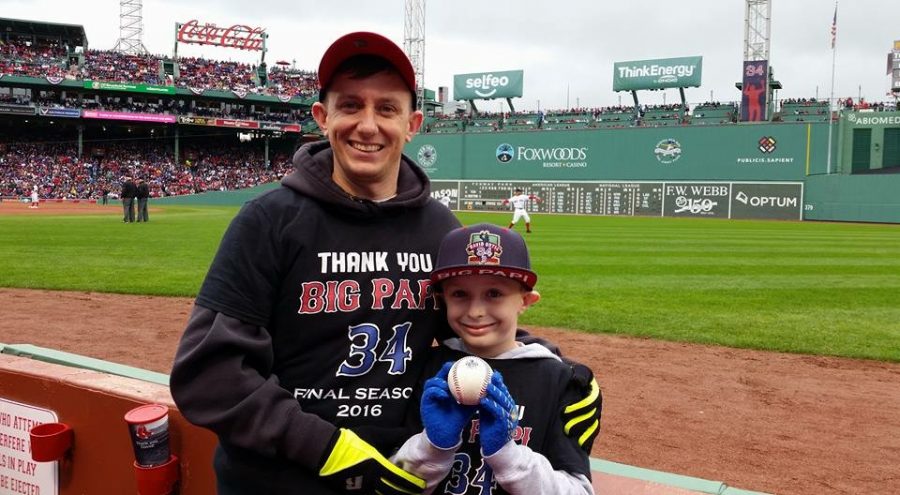

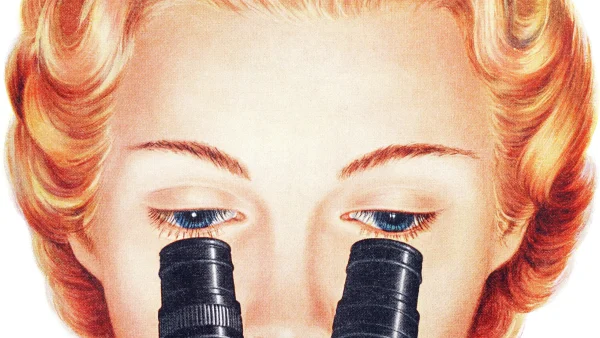
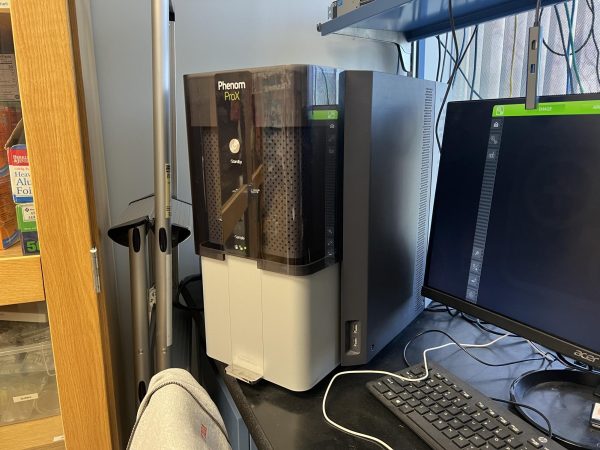
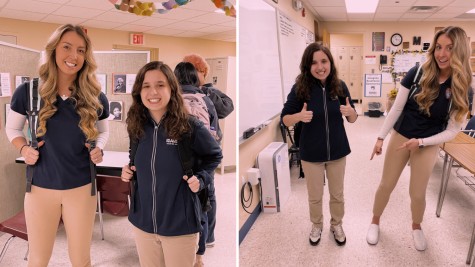

Mary Griffith • May 25, 2018 at 9:19 pm
Jesse was a Second Grade student of mine, and even returned to visit my class for an Earth Day lesson with other members of his high school class. He was and always will be one of my favorite students! ❤️ Although I knew of the tragedy of his father’s death and that of his uncle, I never knew Jesse had been going through this struggle with drugs and alcohol. My heart just breaks to think of what he’s been through! On. the other hand, I couldn’t me more proud of the courageous man he has become! God bless him. My prayers for a bright, happy future He deserves every good thing that comes his way.
Luwana Hersom • May 24, 2018 at 7:14 pm
I have followed Jesse’s journey for a few years and it is amazing.
Never give up HOPE.
He, his son, his mom, fiance are all around amazing people.
PLEASE IF YOU ARE STRUGGLING KNOW YOU CAN TOO LIVE A NEW LIFE!!!